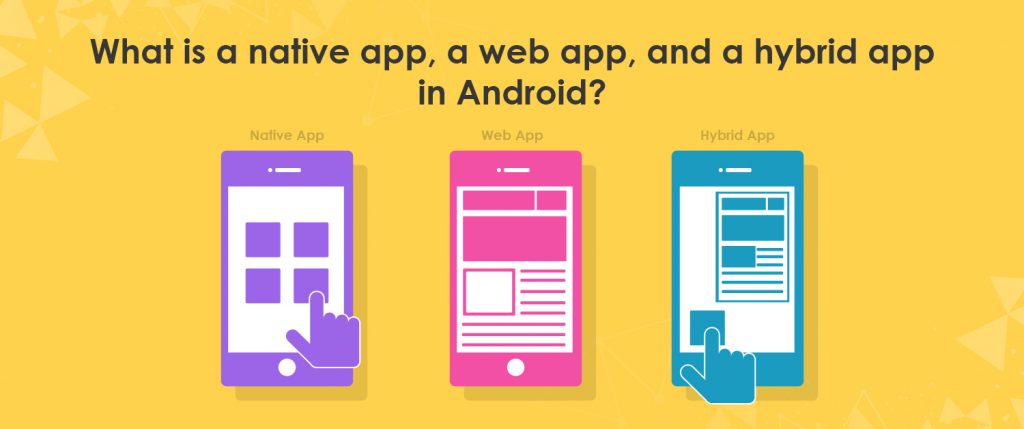
The world is getting confined to their smartphones. It happens to be a vital part of our lives, imagining life without which seems impossible.
This has to lead to an extraordinary surge in the popularity of mobile app development, especially developing apps for Android devices. After all, it shares 76% of the global user base. As enterprises pick up android app development with rapid speed, the dilemma to choose between native apps, web apps, and hybrid apps is unavoidable.
While all the three options look feasible, here we are checking each one of them to understand what they imply and how they are likely to affect mobile app development.
What are native applications?

A native mobile app is a solution tailored to work a specific (set of) tasks on a particular environment or platform. They are made using the Software Development Kit (SDK) for a specific software framework, hardware platform or operating system.
They can be identified as icons present on the device’s home screen.
What are the features of native applications?
- Leverages the built-in features of the mobile such as GPS, movement detectors, and camera
- High-end security features
- Extensively supported by Google PlayStore and thus, are mostly up-to-date and have high quality
- Offer high efficiency and better performance
- As they operate in standalone mode, native apps need regular updates to be downloaded from time to time.
What are the benefits of native apps?
- High performance: Native apps are native to the platform where multiple elements of the app are preloaded. Moreover, the data is fetched from the web rather than the entire application. Therefore, they offer speedy performance.
- Rich user experience: Owing to the dedicated design language, unique elements, and set gestures, native apps offer extraordinary user experience. Thus, developers can invest time in tailoring the app’s functionality.
- Offer offline availability: Most of the native apps are available in offline mode as well.
- Native apps offer recognizable UI/ UX: Native apps are the nuanced versions of the device’s default apps. Thus, the user is thrown up with a trickier interface to use and quickly gets accustomed to the mobile app.
- Highly secure: Since native apps are tested and verified by the Google PlayStore experts, users can rest assured about their security. This also ensures that the apps are fully compatible with the devices.
- Extensive support from the App Stores: Being tested by the App Store, native apps receive comprehensive support from them.
- Easy to discover: Since native apps are available across app stores, they are easy to discover.
What are the drawbacks of native apps?
- Native apps lack flexibility: Native apps are not flexible when it comes to development. Moreover, the cost and time to develop a native app increase with additional platforms. That is, if you want to go beyond android app development to include the development of iOS app, that adds up to the time required for developing the app as well as the cost.
- Time-consuming and high-cost development: Native apps take longer to develop. The addition of time thus shoots up the cost as well.
- High maintenance cost: The cost of maintaining native mobile apps is very high as compared to their counterparts.
- Require frequent updates which takes a toll on the customer base: Native apps require frequent updates for seamless operation. Besides, you rely on the customers to upgrade the apps. In case they fail to notice, you don’t really have a future.
- App approval is lengthy: The process of PlayStore App Approval is a tedious and long one. Moreover, it does not guarantee success.
What are web apps?

Web apps are the application programs that are stored on a remote server. The client-facing apps run on the web browser and are not limited to operate on a single device.
What are the benefits of web apps?
- Easy on the pocket and less time consuming: Web apps are cost-effective and time-saving. This is primarily because they need not be tested across all the operating systems.
- Accessibility: Web apps can be accessed instantly on an extensive range of devices via web browsers. Besides, users don’t need to download the apps from marketplaces.
- Easy maintainability: Web apps are developed using similar codebase across various platforms. This makes it easier for the teams to maintain web apps.
- Easy updates: If you make specific changes corresponding to the content and design, updates can be easily pushed and will reflect in real-time instantly.
- Marketplace approvals not required: Web apps don’t need approval from the app marketplaces. Developers can launch them when they are ready.
- Highly compatible: Web apps are more accessible to ensure compatibility with older devices.
Read More: Discover how Web Responsive App Development can revolutionize your business by ensuring seamless user experiences across all devices.
What are the drawbacks of web apps?
- Maintenance is costly: Since there is a wide range of devices available, it is expensive to maintain web apps.
- Difficult to discover: Since web apps are not available across app stores, they are harder to discover.
- Tracking usage pattern and providing support is difficult: As web apps are open to a broader audience, assessing usage pattern is highly challenging. This also makes it tricky for the support to extend support to the users.
- Lack of security: Since the apps are not verified by a central authority (owned by apps store in case of native apps), web applications are highly vulnerable to security threats. Additionally, there is no guided process to confirm the app’s safety.
- Lack of offline access: Web apps run only on the internet, and hence, they are not accessible in the offline mode.
What are hybrid apps?

Hybrid apps are a combination of native and web apps. These apps can be deployed to various platforms such as Android, iOS, Windows, etc. Additionally, the apps can run across browsers like Chrome, Mozilla, IE, Safari, etc.
Hybrid app development is based on the principle of “write once and deploy everywhere.” Not only are these compatible with various devices and platforms, but they are also cross-compatible with web technologies like HTML5, jQuery, CSS3, Titanium, PhoneGap, and JavaScript, etc.
What are the benefits of hybrid apps?
- Cost-effectiveness: Hybrid app development is cost-effective. Rather than reacting multiple version of the same app for each platform, you can quickly develop for one and deploy on multiple platforms. Moreover, high code reusability allows app deployment across the platform without re-building the app from scratch.
- Scalable: Hybrid apps can be easily scaled up to a wide range of platforms and devices. The reason is web technologies that take up similar syntax across various platforms.
- Less time-to-market: Thanks to code reusability, time to develop hybrid apps is significantly less. Also, the apps are tested like standard software or website. Thus, app store distribution and platform testing are rapid.
What are the drawbacks of hybrid apps?
- UX: Hybrid apps fail to deliver a fully native user experience. The reason is that native apps use system interface components making them user-friendly. This is not possible without compromising performance in case of the hybrid apps.
- Native features: If you want to add a wide range of features to the hybrid apps, it is not possible. Android, as well as iOS, keep certain features only accessible to the native apps. These can’t be integrated into the hybrid apps.
- Glitches: Hybrid apps fail to offer performance equivalent to the native apps. At times, the loading time is slow while sometimes the content loading is slow. This is not the case with native apps. That said, there is a wide range of solutions present to get through with the shortcoming.
- Design: The scope of graphics and visual design is limited in hybrid apps. Every platform takes up a different approach to the operation. Thus, the designer has to adjust the designs to ensure compatibility with each platform.
Android App Development with Matellio…
In an ever-growing Android market, Matellio is a leading Android App development studio that caters to client’s diverse business needs with a keen focus on quality. Our decade-long experience in developing applications across different platforms enables us to offer our clients with distinguishing benefits in terms of standard-focused methodology and process that brings significant results. With a global presence and proven track record in delivering high-end top notch solutions, Matellio ensures timely and on-budget delivery to clients across geographies to give you an extra edge.



